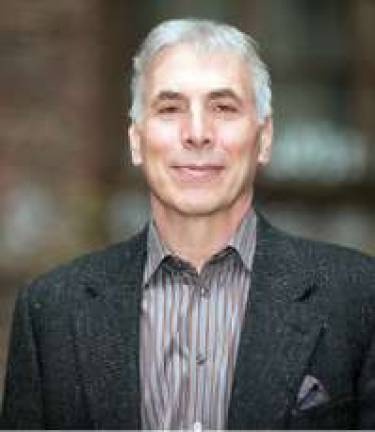Brain Exercise

Author remembers his age as he develops memory techniques
Authors Michael J. Gelb and Kelly Howell recently released Brain Power: Improve Your Mind As You Age, a book that attempts to demystify the long-standing belief that memory declines with age and offers simple tricks and techniques to improve brain activity and enhance overall mental well-being. Gelb, who leads seminars around the world on the subject, has written 12 books, including How to Think Like Leonardo da Vinci: Seven Steps to Genius Every Day and Innovate Like Edison: The Five-Step System for Breakthrough Business Success. He has won a number of awards, including the Brain Trust Charity's "Brain of the Year" award. A former professional juggler, Gelb once performed with The Rolling Stones and Bob Dylan. We spoke with Gelb about their new book, the biggest misconception people have about memory and aging and the different methods people can use to increase their mental acuity. Why did you decide to write this book? I wrote it for two reasons. One is because there are tens of millions of baby boomers who need to read it-the book provides simple lifestyle and attitude changes people can make so they can live happier and more fulfilling lives. There's a personal reason, too. I'm approaching 60 myself, so I'm at an age where I'm thinking about my memory and mental well-being. Why were you a good person to co-author it? I have been passionately studying the mind and how to develop it for a very long time. And I don't just study it theoretically; I put the techniques I talk about to practice in my everyday life. At my age, I'm a good candidate to try them out. I also lecture all over the world and see them work in the people in the audiences. I've also closely studied some of the greatest minds in history, including Leonardo da Vinci and Thomas Edison, when writing my books. What kind of research went into writing the book? I studied a variety of research to see what the average person can do as they get older to strengthen their memory. I interviewed experts in the field, including physicians, gerontologists and neuroscientists. My goal was to discover what simple, research-validated techniques there are to improve our mental well-being. What is the biggest misconception people have about memory? Most people think that their memory is doomed to decline and they are destined to forget everything when they get older. That's totally absurd. Even when people are young, if they forget something they say, "Oh, I'm having a senior moment." But ask any elementary school teacher; kids forget things all the time. They don't dwell on it, though. You never hear them say, "I'm having a junior moment." They just move on with their day. It's when people start commiserating with each other that they're getting older and are forgetting everything-they begin to self-hypnotize and they actually do start forgetting things. What are some things people can do to improve memory in the long run? Exercise is key. Getting the blood pumping to deliver oxygen to the brain helps improve mental activity. Weight training and tai chi both improve posture, strengthen the ligaments and muscles and strengthen the immune system. Practicing your balance also helps. Try standing on one leg or a balance board. It's important to keep strengthening and nurturing your balance. What are some quick tips and techniques people can do every day? The most important thing people can do is learn something new every day for just 15 minutes. Get out of your habitual rut and do something different. This could be reading a book, learning about a new subject, having a lively conversation, going to a museum or playing a brain game. It should be challenging and stimulate your mind. Another technique is to use your non-dominant hand for 15 minutes. What would you say is your favorite tip? One of the best reactions I get from people who hear me speak is when I tell them to take a daily dose of GFH-that's gratitude, forgiveness and humor. These are really simple things that anecdotal wisdom tells us is good for us, but now there is scientific backing that validate their benefits. At what age should people start actively working to improve their memory? I recommend doing these things if you want to maintain mental acuity at any age. It's flat-out common sense for living a happy and fulfilling life. It's never too early to start. However, as you get older, your margin of error declines. In your twenties, you can get away with abusing your body, but that gets harder in your forties and even harder in your fifties. So as you get older, it's something you should think about more and more. Did you come across any controversy in the scientific community on these subjects as you conducted research for the book? One neuroscientist argued that we do lose brain cells as we get older. And I don't dispute that. However, we both came to the agreement that it is not so much the number of brain cells we have but how we use them. The goal is to use them often and extensively. For more information, visit www.michaelgelb.com.